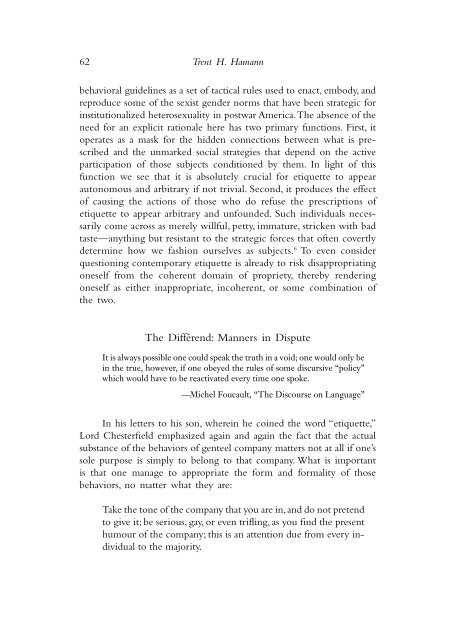You also want an ePaper? Increase the reach of your titles
YUMPU automatically turns print PDFs into web optimized ePapers that Google loves.
62 Trent H. Hamann<br />
behavioral guidelines as a set <strong>of</strong> tactical rules used to enact, embody, and<br />
reproduce some <strong>of</strong> <strong>the</strong> sexist gender norms that have been strategic for<br />
institutionalized heterosexuality in postwar America. The absence <strong>of</strong> <strong>the</strong><br />
need for an explicit rationale here has two primary functions. First, it<br />
operates as a mask for <strong>the</strong> hidden connections between what is prescribed<br />
and <strong>the</strong> unmarked social strategies that depend on <strong>the</strong> active<br />
participation <strong>of</strong> those subjects conditioned by <strong>the</strong>m. In light <strong>of</strong> this<br />
function we see that it is absolutely crucial for etiquette to appear<br />
autonomous and arbitrary if not trivial. Second, it produces <strong>the</strong> effect<br />
<strong>of</strong> causing <strong>the</strong> actions <strong>of</strong> those who do refuse <strong>the</strong> prescriptions <strong>of</strong><br />
etiquette to appear arbitrary and unfounded. Such individuals necessarily<br />
come across as merely willful, petty, immature, stricken with bad<br />
taste—anything but resistant to <strong>the</strong> strategic forces that <strong>of</strong>ten covertly<br />
determine how we fashion ourselves as subjects. 6 To even consider<br />
questioning contemporary etiquette is already to risk disappropriating<br />
oneself from <strong>the</strong> coherent domain <strong>of</strong> propriety, <strong>the</strong>reby rendering<br />
oneself as ei<strong>the</strong>r inappropriate, incoherent, or some combination <strong>of</strong><br />
<strong>the</strong> two.<br />
The Différend: Manners in Dispute<br />
It is always possible one could speak <strong>the</strong> truth in a void; one would only be<br />
in <strong>the</strong> true, however, if one obeyed <strong>the</strong> rules <strong>of</strong> some discursive “policy”<br />
which would have to be reactivated every time one spoke.<br />
—Michel Foucault, “The Discourse on Language”<br />
In his letters to his son, wherein he coined <strong>the</strong> word “etiquette,”<br />
Lord Chesterfield emphasized again and again <strong>the</strong> fact that <strong>the</strong> actual<br />
substance <strong>of</strong> <strong>the</strong> behaviors <strong>of</strong> genteel company matters not at all if one’s<br />
sole purpose is simply to belong to that company. What is important<br />
is that one manage to appropriate <strong>the</strong> form and formality <strong>of</strong> those<br />
behaviors, no matter what <strong>the</strong>y are:<br />
Take <strong>the</strong> tone <strong>of</strong> <strong>the</strong> company that you are in, and do not pretend<br />
to give it; be serious, gay, or even trifling, as you find <strong>the</strong> present<br />
humour <strong>of</strong> <strong>the</strong> company; this is an attention due from every individual<br />
to <strong>the</strong> majority.
















